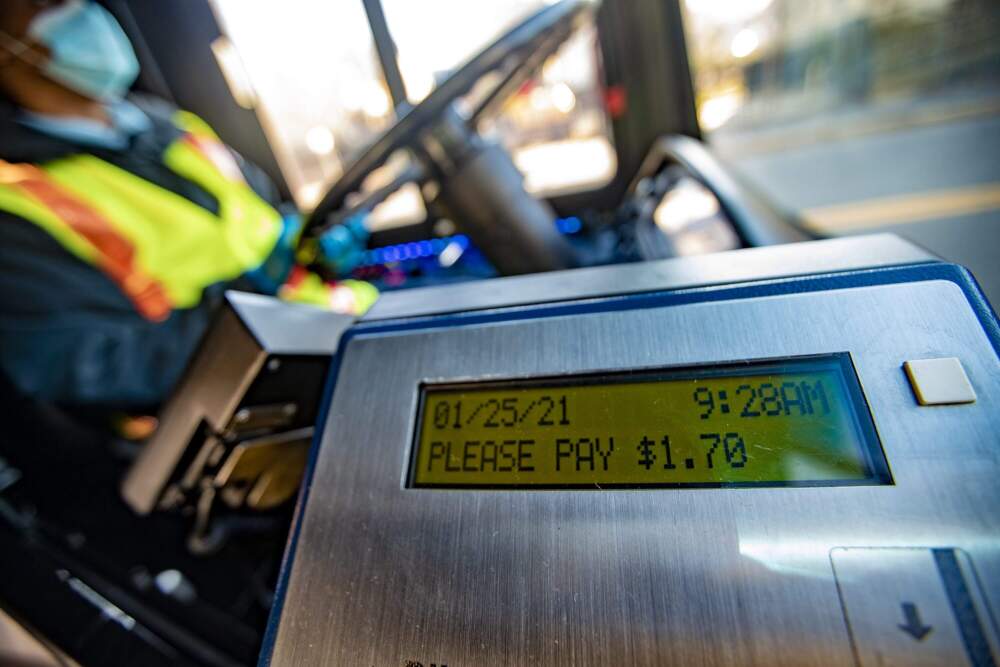Advertisement
Boston's Morning Newsletter
MBTA board slated to vote on low-income fare program — and two other changes

Editor's Note: This is an excerpt from WBUR's daily morning newsletter, WBUR Today. If you like what you read and want it in your inbox, sign up here.
It’s Opening Day Night for the Red Sox. While local sports fans might be a little preoccupied with March Madness at TD Garden (not to mention the NCAA men’s hockey tournament over in Springfield), the Sox are opening their 2024 season at 10:10 p.m. in Seattle. It’s the first of a 10-game, West Coast road trip to start the year. (The Sox won’t their play first game at Fenway Park until April 9.)
If you’re lacking motivation to stay up late to watch another mediocre Sox team, just remember what Leslie Epstein — a local novelist and father of Theo Epstein — recently told WBUR’s Sharon Brody: “Knowledge comes through suffering.”
To the news:
Now arriving: The MBTA’s Board of Directors is slated to vote on a slate of fare changes this morning — some minor, one quite major. Here’s what to know:
1. Low-income fares: This is the big one. The new program — forecasted to eventually cost $58 million a year — would offer half-price fares to low-income riders on all of the T’s services. Officials estimate 62,000 riders between the ages of 26 and 64 will enroll within the next five years (the T already offers half-off fares to students, low-income young adults and seniors). Individuals making up to $29,000 (or $60,000 for households of four) would be eligible to sign up for the discount.
- If approved, T officials have said it will take another two to six months to stand up the program, which would include an online application and special CharlieCards.
2. Wave goodbye to change tickets: If you’re boarding a bus or Green Line trolley and only have, say, a $5 bill to pay for your fare, you used to get your change back on a paper CharlieTicket with stored value. According to the T, it happens 10,000 to 15,000 times a month. But no more. The T is phasing out change tickets as it works on updating its fare collection technology. (This change technically began as a pilot on March 1 and today’s vote would make it permanent.)
- Instead, the T has begun stocking buses with CharlieCards — which riders can load with their cash. (Here’s a video tutorial.)
- However, there won’t be any Charlie Cards handed out on the Green Line or Mattapan trolleys, so it’s better to bring exact change if you plan to pay onboard. (The T is also changing the fare boxes to only accept $1 and $5 bills, so no one gets a $20 bill — or larger — eaten with no change back.)
3. Want to take the commuter rail to the beach this Memorial Day? This final change would extend the T’s popular $10 pass for unlimited commuter rail weekend trips to federal holidays, too. Officials say the change would boost ridership at virtually no cost.
A new era: Boston is about to get its own planning department, under City Hall’s purview. As WBUR’s Simón Rios reports, the City Council approved Mayor Michelle Wu’s proposal to shift resources away from the Boston Planning & Development Agency, which she has long criticized for a “lack of transparency and misguided priorities.”
- FYI: This is not the total abolition of the BPDA that Wu proposed as a mayoral candidate. However, she says the new planning department will help the city sync development with goals like climate resilience and affordable housing.
The latest: The number of people alleging a former Brigham and Women’s doctor sexually abused them continues to rise. The Boston Globe reports 206 plaintiffs (mostly women) have now joined the class action suit against former rheumatologist Dr. Derrick Todd, who they say performed unnecessary pelvic and breast exams over 14 years.
- Todd resigned from the hospital in July and later agreed to no longer practice medicine. He has not admitted any wrongdoing.
Coal-free, wherever we may be: New England’s last running coal plant —Merrimack Station in Bow, New Hampshire — will shut down in 2028. As part of a settlement with two environmental groups, the plant’s owner will also shutter a coal facility in Portsmouth, too.
- What’s next: The two sites are slated to become “renewable energy parks” that host solar panels and battery storage.
P.S.— CitySpace is transforming into a karaoke bar tonight for the latest rendition of our free, monthly Field Trip meetup series. Join us for bops, ballads and bangers alike! (And yes, there’ll be liquid courage available for purchase.) Secure your spot here.
